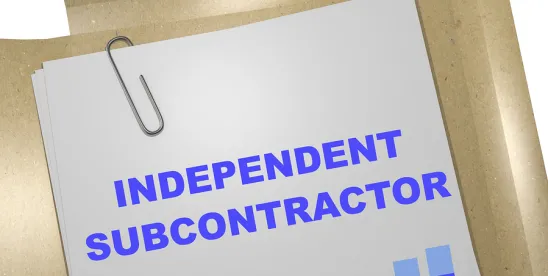Several important changes to Bayh-Dole Act implementing regulations took effect on May 14, 2018, that will apply to funding agreements executed after that date and may apply to existing funding agreements modified after that date. In this article, we focus on the most significant patent-related changes.
The Bayh-Dole Act & Implementing Regulations
The Bayh-Dole Act governs rights in inventions made with U.S. federal government funding. Broadly speaking, the Act imposes invention disclosure obligations on “contractors,” permits contractors to elect to retain title (subject to a worldwide, non-exclusive license to the U.S. government), and requires contractors to pursue patent protection and commercialization. The Act also permits the U.S. government to restrict or eliminate the contractor’s rights under defined ‘‘exceptional’’ circumstances. While the Act refers to non-profit organizations, universities, and small businesses, it was expanded to apply to businesses of all sizes by Executive Order 12591, as now expressly reflected in the revised implementing regulations.
The implementing regulations discussed here are set forth in 37 CFR § 401, and primarily relate to the “standard clauses” required to be in funding agreements awarded to contractors. As summarized in the Federal Register Notice, the “standard clauses” generally obligate contractors to:
- disclose each subject invention to the Federal agency within two months after the contractor’s inventor discloses it in writing to contractor personnel responsible for patent matters
- elect in writing whether or not to retain title to any subject invention within two years of the disclosure to the Federal agency
- file an initial patent application on a subject invention within one year after election (or prior to expiration of any statutory bar)
- execute and promptly deliver to the Federal agency all instruments necessary to establish/confirm the government rights in the subject invention
- require, by written agreement, the contractor’s employees to disclose promptly in writing each subject invention
- notify the Federal agency of any decision not to continue prosecution of a patent application
- include in the specification of any U.S. patents/applications a statement that the invention was made with government support under the grant or contract awarded by the Federal agency, and that the government has certain rights in the invention
- submit periodic reports as requested on the utilization of the subject invention
- agree that neither the contractor nor any assignee will grant to any person the exclusive right to use or sell any subject inventions in the U.S. unless such person agrees that any products embodying the subject invention or produced through the use of the subject invention will be manufactured substantially in the U.S.
As set forth in the Federal Register Notice, the revised rules clarify electronic reporting, update certain sections to conform with changes in the patent laws, streamline the licensing application process for some Federal laboratory collaborators, make technical corrections, clarify the role of provisional patent application filing, explain a unique situation that may be appropriate for a Determination of Exceptional Circumstances, clarify the role of funding agencies in the Bayh-Dole process, and address subject inventions as to which a Federal laboratory employee is a co-inventor.
Patent-Related Changes To Bayh-Dole Implementing Regulations
Practitioners who manage or oversee inventions subject to the Bayh-Dole Act should study the revised rules in depth. Some key patent-related changes include:
- clarifying that the Bayh-Dole Act and implementing regulations apply to funding agreements with business firms regardless of size (as well as to nonprofit organizations), except for funding agreements made primarily for educational purposes
- requiring contractors to require by written agreement that its employees assign subject inventions to the contractor and execute all papers necessary to file patent applications and establish the government’s rights in subject inventions
- clarifying that a PCT application that designates the U.S. qualifies as an “initial” application
- clarifying that the “statutory period” in the patent provisions refers to the one-year grace period available under the AIA-version of 35 USC § 102(b)(1).
- permitting contractors to request extensions of time for filing a non-provisional application after a provisional application has been filed (to permit re-filing of a provisional application), and provide for automatic granting of a one-year extension to file a non-provisional application unless the Federal agency notifies the contractor within 60 days of receiving the request
- extending the time period within which contractors are required to provide prior notice to the Federal agency to no less than 60 days prior to the expiration of the statutory deadline, and expanding the list of decisions subject to the prior notice requirement to include:
- to request, be a party to, or take action in a trial proceeding before the Patent Trial and Appeals Board of the U.S. Patent and Trademark Office, including but not limited to post-grant review, review of a business method patent, inter partes review, and derivation proceeding;
- to request, be a party to, or take action in a non-trial submission of art or information at the U.S. Patent and Trademark Office, including but not limited to a preissuance submission, a post-issuance submission, and supplemental examination.
Importantly, the revisions remove the time limit within which a Federal agency can take title due to a contractor’s failure to timely disclose or elect title to a subject invention. According to the Federal Register Notice, this change is being made because “[a] contractor’s failure to timely disclose or elect title to a subject invention, both as required by its funding agreement, can work to deny the Federal government any rights in the funded invention, through no fault of the funding agency.”
Early Non-Provisional And Foreign Patent Filing Deadlines
While the previous version of 37 CFR § 401.14(c)(3) required contractors to file PCT and/or foreign patent applications within 10 months of filing an initial U.S. application (instead of the 12 months provided by the Patent Cooperation Treaty and Paris Convention), the revised rule expressly extends this “early” filing requirement to non-provisional applications filed after an initial provisional application:
(3) The contractor will file its initial patent application on a subject invention to which it elects to retain title within one year after election of title or, if earlier, prior to the end of any statutory period wherein valid patent protection can be obtained in the United States after a publication, on sale, or public use. If the contractor files a provisional application as its initial patent application, it shall file a non-provisional application within 10 months of the filing of the provisional application. The contractor will file patent applications in additional countries or international patent offices within either ten months of the first filed patent application or six months from the date permission is granted by the Commissioner of Patents to file foreign patent applications where such filing has been prohibited by a Secrecy Order.
If these requirements are not met, the Federal agency may obtain title to the subject invention, but if the contractor has filed a patent application in a given country after the time period specified but prior to its receipt of a written request to convey title from the Federal agency, “the contractor shall continue to retain title in that country.”
As noted above, revisions to 37 CFR § 401.14(c)(5) provide for automatic one-year extensions for filing non-provisional applications, although a request for such an extension is required:
(5) Requests for extension of the time for disclosure, election, and filing under paragraphs (1), (2), and (3) of this clause may, at the discretion of the Federal agency, be granted. When a contractor has requested an extension for filing a non-provisional application after filing a provisional application, a one-year extension will be granted unless the Federal agency notifies the contractor within 60 days of receiving the request.
Many Strings Attached
U.S. government funding is an important source of funding for many small businesses and research institutions. While such funding comes with many strings attached, the ability to hold title to an invention developed with federal government support usually outweighs the administrative burdens of complying with the applicable statutory requirements and regulations. Contractors should take care to comply with these requirements, particularly in view of recent public scrutiny of private rights in federally-funded research.




 />i
/>i

